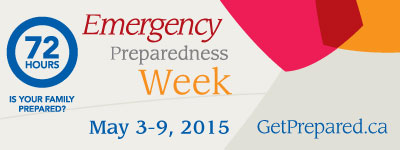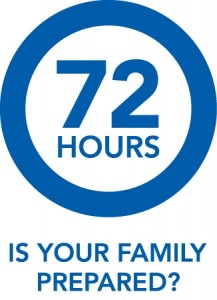 In my volunteer life, I am a member of the local ESS (Emergency Support Services) and CDART (Canadian Disaster Animal Response Team). I help with disaster response – I help evacuate and take care of people and animals who are affected by disasters like a forest fire, flood, earthquake, ice storm, chemical spill, explosion, or apartment fire.
In my volunteer life, I am a member of the local ESS (Emergency Support Services) and CDART (Canadian Disaster Animal Response Team). I help with disaster response – I help evacuate and take care of people and animals who are affected by disasters like a forest fire, flood, earthquake, ice storm, chemical spill, explosion, or apartment fire.
In BC, the weather experts are predicting a bad forest fire year. This means this summer might mean a lot of large scale evacuations, like we faced in 2003.
In a small scale response, less than 100 people, services and emergency aid can often be quickly provided. In BC, the government provides for 3 days of emergency care in case of a disaster. Other geographic areas may provide only 24 hours of care, before insurance and regular social services step in.
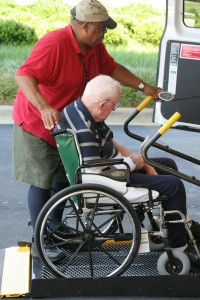 For people with disabilities, preparation is even more important. If you do not use a personal attendant, it is important to have a support network to assist you in coping with an emergency. Do not depend on one person. Try to identify a minimum of three people at each location where you regularly spend a significant part of your week: job, home, school, volunteer site, etc.
For people with disabilities, preparation is even more important. If you do not use a personal attendant, it is important to have a support network to assist you in coping with an emergency. Do not depend on one person. Try to identify a minimum of three people at each location where you regularly spend a significant part of your week: job, home, school, volunteer site, etc.
Things to consider:
- Exchange important keys.
- Share copies of relevant emergency documents, contact names and health information.
- Agree on a communications system outside of regular phone services.
- Advise each other when you will be out of town.
- Have your support network check on you if there is a disaster and have a plan for transportation, if required.
 The problems arise when there is a larger disaster. When thousands of people need to be evacuated or are stranded without electricity, heat or water, then government response can be slow. Seniors are at increased risk. If you have mobility challenges, you may have to wait for a vehicle or boat to help you evacuate. The mobility equipment you need might not function, such as elevators and stair lifts. Seniors can also be more susceptible to temperature extremes and stress. Cell and land-line phones may not work. But there are simple things that you can do to prepare.
The problems arise when there is a larger disaster. When thousands of people need to be evacuated or are stranded without electricity, heat or water, then government response can be slow. Seniors are at increased risk. If you have mobility challenges, you may have to wait for a vehicle or boat to help you evacuate. The mobility equipment you need might not function, such as elevators and stair lifts. Seniors can also be more susceptible to temperature extremes and stress. Cell and land-line phones may not work. But there are simple things that you can do to prepare.
- If you can’t shut off utilities yourself, make arrangements for your neighbours to help you with this. Find out where your shutoff valves for gas and water are now.
- Make sure you have emergency supplies on hand, including water, medications, a flashlight and batteries, a small battery operated radio (with extra batteries), and 72 hours of food that doesn’t need to be heated.
- Plan for enough disability-related supplies for up to two weeks (medication, syringes, colostomy, respiratory, catheter, padding, distilled water, gloves,etc.). If you have a respiratory, cardiac or multiple chemical sensitivities condition, store towels, masks, industrial respirators or other supplies you can use to filter your air supply. Evacuation centers may be short of supply of basic medical supplies.
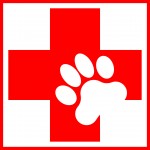 If you do evacuate, be sure to take your pets with you. It can be days or weeks until emergency services are able to access your property and by that time, your pet may have died from the disaster, the heat or cold, or simply lack or food or water. There are services to help take care of your animal once you evacuate, but not all areas have services in place to go in an evacuate your pets after a disaster. And if the disaster is severe or widespread, there it may not be safe for emergency personnel to go get your pets out in time. If you are not home to get your pets, make sure you contact the emergency support services right away to arrange for your pets to be evacuated when they can. They will know which local agency is handling pet evacuations. In most areas of BC, it is CDART – the Canadian Disaster Animal Response Team. The SPCA no longer handles pet evacuations.
If you do evacuate, be sure to take your pets with you. It can be days or weeks until emergency services are able to access your property and by that time, your pet may have died from the disaster, the heat or cold, or simply lack or food or water. There are services to help take care of your animal once you evacuate, but not all areas have services in place to go in an evacuate your pets after a disaster. And if the disaster is severe or widespread, there it may not be safe for emergency personnel to go get your pets out in time. If you are not home to get your pets, make sure you contact the emergency support services right away to arrange for your pets to be evacuated when they can. They will know which local agency is handling pet evacuations. In most areas of BC, it is CDART – the Canadian Disaster Animal Response Team. The SPCA no longer handles pet evacuations.
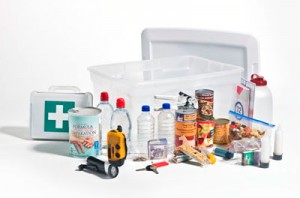 It is up to each individual to make sure that you can survive on your own or with minimum services for a minimum of 3 days and up to a week. One way to do this is to prepare a “grab and go” kit. This kit should be stored by your door for easy access. Your kit should contain at least 3 days of medications, a spare pair of eyeglasses, copies of id and insurance policies, some food, some clothing and shoes, and water. A flashlight, radio, first aid kit, a wrench to shut of the gas, and a whistle are good additions to the kit. Be sure to have a kit for your pets as well.
It is up to each individual to make sure that you can survive on your own or with minimum services for a minimum of 3 days and up to a week. One way to do this is to prepare a “grab and go” kit. This kit should be stored by your door for easy access. Your kit should contain at least 3 days of medications, a spare pair of eyeglasses, copies of id and insurance policies, some food, some clothing and shoes, and water. A flashlight, radio, first aid kit, a wrench to shut of the gas, and a whistle are good additions to the kit. Be sure to have a kit for your pets as well.
You can also make emergency personnel’s job easier by adding an entry in the contacts list in your cell phone under the label ICE (in case of emergency) with the names and phone numbers of people that should be called in case of an accident or injury. Simply put the acronym ICE before the names you want to designate as key contacts or next of kin — creating entries such as ICEI, ICE2 and ICE3 etc
You should also have a place or out of town phone number prearranged so you can be reunited with your family. Don’t be caught unprepared!
Emergency preparedness resources:
Emergency Preparedness BC – https://www2.gov.bc.ca/gov/content/safety/emergency-preparedness-response-recovery/preparedbc
Preparedness resources for people with disabilities: https://www2.gov.bc.ca/assets/gov/public-safety-and-emergency-services/emergency-preparedness-response-recovery/embc/preparedbc/preparedbc_preparedness_for_people_with_a_disability_guide_web.pdf
Self assessment checklist – complete BEFORE a disaster so you have all an overview of your medications and needs handy for responders: https://www2.gov.bc.ca/assets/gov/public-safety-and-emergency-services/emergency-preparedness-response-recovery/embc/preparedbc/preparedbc-guides/preparedbc_household_plan_2019.pdf
Ready America: http://www.ready.gov/america/getakit/index.html
Center for Disease Control and Prevention: https://emergency.cdc.gov/
Disabilities Preparedness: https://www.getprepared.gc.ca/cnt/rsrcs/pblctns/pplwthdsblts/index-en.aspx
Get Prepared Canada: http://www.getprepared.gc.ca/index-eng.aspx
Earthquake Preparedness: https://www2.gov.bc.ca/gov/content/safety/emergency-preparedness-response-recovery/preparedbc/know-your-hazards/earthquakes
For your pets:
- Cat Grab ‘n Go Shopping List – http://www.cdart.org/PDF/Grab-n-Go-Shopping-List-Cat.pdf
- Dog Grab ‘n Go Shopping List – http://www.cdart.org/PDF/Grab-n-Go-Shopping-List-Dog.pdf
- Bird Grab ‘n Go Shopping List – http://www.cdart.org/PDF/Grab-n-Go-Shopping-List-Bird.pdf
